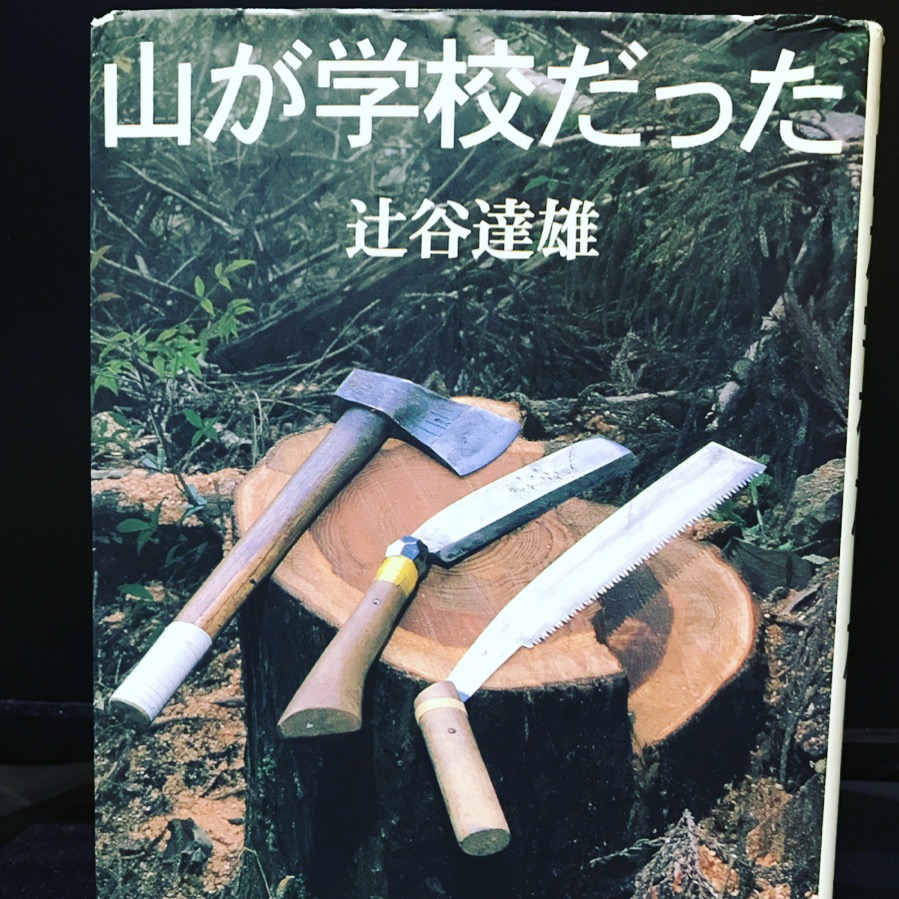(Please scroll down for the English version.)
トーク・オン・ウッド:辻谷達雄
中学校を卒業してから、辻谷達雄さん(八十五歳)は毎日日記を書いている。今まで書いた日記は大きなダンボール箱で重なっている。執筆する心をもっている辻谷さんは一年間をかけて、自分の人生を振り返る「山が学校だった」という本を書いて、平成十年に発行した。最近、僕はこの本を読みながら、辻谷さんの暖かい言葉を通して、昭和の川上村を垣間見る機会がある。もちろん泣くところもあり、笑うところもある。まだ本を読んでいる途中でも、できれば、辻谷さんの話を直接聞きたくなった。先日、川上村の柏木集落の一番上まで登り、辻谷さんを訪れた。
鉄網と丸太で作られた長いランプが少々曲がりながら道路から家まで続く。辻谷さんはこの家に生まれて育った。こちらから吉野川の対岸へ通学したり、隣の集落の森へ通勤したりした。
世代交代を目撃した辻谷さんは山から原木を滑らせる「修羅」の組み立て、原木を吉野川で流す作業などを見ることができた。川で原木を流す方法が放棄される前に、辻谷さんは最後に一回少し乗れた。辻谷さんは製材、割り箸、鶏飼いをやってみたが、いつも山の仕事に戻った。何年間山の仕事をしてから、辻谷さんは「山」と「辻谷」の組み合わせで「ヤマツ産業」を有限会社として設立した。ヤマツ産業は融資を受けたり、チェインソーやヘリのようなテクノロジーを使ったり、「山の何でもをする!」と宣伝するテレビCMを作ったりした。吉野林業の歴史と前の世代のやり方を参考にしながら、その時まで川上村の林業会社がやっていなかったことを辻谷さんは積極的にやってみた
辻谷さんの本を読みながら一番感動したのは結婚式の話であった。当時、大きな披露宴が流行っていたが、辻谷さんは自分で考えて、それをしないと決めた。身内の人と公民館で集まり、みんなの前で奥さんと必要な書類を著名した。こんな風にすることによって、彼らはお互いと約束をし、この約束が一番大事な人に目撃してもらった。周りから何が言われても、辻谷さんは自分にとっての正しいことをする勇気をもち、本当に素敵なことができたと著者は思う。
「山が学校だった」を発行した平成十年に、辻谷さんは「たっちゃんクラブ」を始めた。山の知識を伝えながら、山を守る新たな産業を見出したいという目標で始めた。山菜を集める、山の観察、山の神の参拝などの体験教室を開催して、大阪や和歌山から川上村まで来る参加者が多い。毎月のイベントに申込者が多いため、参加を抽選で決めることになった。20年をかけて1万人を超えた参加者を山に連れて行ったあと、辻谷さんは事故や自分の年を心配するようになった。辻谷さんは今年たっちゃんクラブを「卒業する」と言って、満員のままで最後のイベントを開催した。しかし、これから二冊目の本を書く予定があり、一冊目と同じように川上村へ人をひっぱるのであろう。
話の後、辻谷さんと一緒に家の上の森をふらっと歩いた。子供の頃からこの森で遊んだりした辻谷さんは、当然あらゆる山菜と木のことを知っている。山の話が次から次へ流れながら、辻谷さんは僕より山を早く登った。「マムシに気をつけや」と言ってから、マムシを真似た植物を見せてくださった。そのあと、家で干したマムシも見せてくださった。
子供の頃から山菜を集めて遊んだり、仕事で山を細かく管理したりした辻谷さんは、自分の人生の経験を結局たっちゃんクラブの体験教室にすることができた。木と同じく、辻谷さんは一生を山で過ごして、その歳月によって素敵なことができた。こういう「山に優しい観光」が未来の手がかりになるような気がする。森はもちろんそのままで美しいが、その美しさを上手に紹介できる人が本当に宝物である。僕は辻谷さんに山の何が好きなのかを訊いてみた。「私は生まれたのは山の中だから、生活そのものが自然の中で、普通、当たり前やろ。『何がええか悪いか』よう聞かれる。それが村外、町の人に決めてもらおう。私は分からん。」
Talk On Wood: Tatsuo Tsujitani
Since graduating from junior high school, Tatsuo Tsujitani (85) writes in his diary everyday. All of the diaries he has written up to now are piled high in cardboard boxes. With a mind for writing, Mr. Tsujitani spent a year writing “The Mountain Was My School”, a book published in 1998 that looks back on his life. Recently I have been reading his book, with opportunities to catch glimpses of the Showa era Kawakami Village through Mr. Tsujitani’s warm words. Of course there are places to cry and places to laugh. Though I am still reading the book, if possible, I wanted to hear what Mr. Tsujitani had to say directly. So the other day, I climbed all the way to the top of the Kashiwagi ward of Kawakami Village and visited him.
The long ramp made of steel net and logs bends slightly continues from the road up to his house. Mr. Tsujitani was born and raised in this house. It was from here that he would go to school on the opposite side of the Yoshino River, or go to work in the forests of a neighboring ward. Having witnessed a generational shift, Mr. Tsujitani was able to see the assembly of “shura”, which were used to slide logs down the mountain, as well as the work sending logs down the river. Before the system of sending logs down the river was abandoned, he was able to ride one at the end. Mr. Tsujitani even tried making lumber, chopsticks, and raising chickens, but he always went back to working in the forests. After working in the forests for many years, Mr. Tsujitani combined the words “mountain (yama)” and “Tsujitani”, and established his limited company, Yamatsu Industries. Yamatsu Industries took out loans, incorporated new technology like helicopters and chainsaws, and even created TV advertisements saying “We’ll take care of anything on the mountain!”. While referencing the history of Yoshino forestry as well as the previous generation’s methods, Mr. Tsujitani was proactive in trying things that the other forestry companies of Kawakami Village hadn’t done yet.
While reading Mr. Tsujitani’s book, the thing that moved me most was his wedding. At the time, large receptions were popular, but Mr. Tsujitani thought on his own, and decided he wouldn’t do that. They gathered with close friends and family in the local community building, and he and his wife stamped the proper paperwork in front of everyone. In doing so, they made a promise with one another, and this promise was witnessed by those most important to them. No matter what people around him said, Mr. Tsujitani had the courage to do what was right for himself, and ended up creating something beautiful.
In 1998, the same year he published “The Mountain Was My School”, Mr. Tsujitani started the “Tacchan Club”. While passing along knowledge of the forest, he began the club with the purpose of finding another industry that could protect the mountain. The club held experiences that included gathering wild vegetables, observing the forest, paying respects to the gods of the mountain, etc., and many participants came to Kawakami Village all the way from Osaka or Wakayama. Since there were so many applicants for the monthly events, they ended using a lottery to determine participants. After taking more than 10,000 people into the mountains over a course of 20 years, Mr. Tsujitani began worrying about both the possibility of accidents as well as his own age. Mr. Tsujitani said that this year he “graduated” from his Tacchan Club, and even the final event was held at full capacity. However, he plans to write a second book, which I expect will probably pull some people toward Kawakami Village just like his first one.
After we finished talking, I walked with Mr. Tsujitani into the forest above his house. Having played in this forest since he was a child, Mr. Tsujitani of course knows everything about the wild vegetables and trees. He climbs up and down the mountain faster than me, as he tells me one thing after another about everything around us. “Watch out for the mamushi,” he says, and then shows me the mamushigusa, a plant which has leaves and a pattern imitating the viper. He later showed me a dried mamushi back at his house.
Playing and gathering wild vegetables since he was a kid, taking detailed care of the mountain as part of his work, Mr. Tsujitani was eventually able to take his own life experiences and turn them into the hands-on experiences of the Tacchan Club. Just like the tree, he has spent his life on the mountain, and through time has created something beautiful. This “Mountain-friendly Tourism” seems like a clue for the future. Of course the forest is beautiful on its own, but a person who can skillfully introduce that beauty is also a treasure. I asked Mr. Tsujitani what he likes about the mountains. “Since I was born in the mountains, daily life itself is in nature, so it’s the norm, a given. I am asked pretty often, ‘What’s good, what’s bad’ about the mountains. I’ll let the people from outside our village, the townspeople decide that. I have no idea.”







